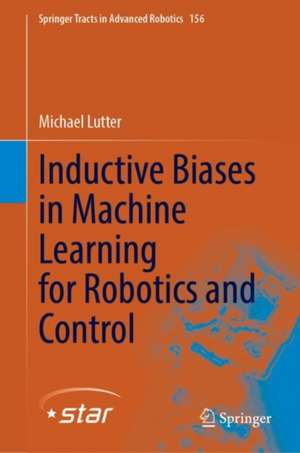Inductive Biases in Machine Learning for Robotics and Control: Springer Tracts in Advanced Robotics, cartea 156
Autor Michael Lutteren Limba Engleză Hardback – aug 2023
Din seria Springer Tracts in Advanced Robotics
- 18%
 Preț: 910.26 lei
Preț: 910.26 lei - 18%
 Preț: 893.71 lei
Preț: 893.71 lei -
 Preț: 445.98 lei
Preț: 445.98 lei -
 Preț: 406.43 lei
Preț: 406.43 lei - 13%
 Preț: 371.07 lei
Preț: 371.07 lei - 17%
 Preț: 378.35 lei
Preț: 378.35 lei - 15%
 Preț: 640.88 lei
Preț: 640.88 lei - 18%
 Preț: 783.98 lei
Preț: 783.98 lei - 15%
 Preț: 641.74 lei
Preț: 641.74 lei - 15%
 Preț: 640.88 lei
Preț: 640.88 lei - 18%
 Preț: 994.72 lei
Preț: 994.72 lei - 18%
 Preț: 778.45 lei
Preț: 778.45 lei - 18%
 Preț: 730.35 lei
Preț: 730.35 lei - 18%
 Preț: 1233.83 lei
Preț: 1233.83 lei - 18%
 Preț: 951.47 lei
Preț: 951.47 lei - 15%
 Preț: 640.06 lei
Preț: 640.06 lei - 18%
 Preț: 1844.67 lei
Preț: 1844.67 lei - 15%
 Preț: 642.51 lei
Preț: 642.51 lei - 18%
 Preț: 1112.30 lei
Preț: 1112.30 lei - 15%
 Preț: 665.08 lei
Preț: 665.08 lei - 18%
 Preț: 947.85 lei
Preț: 947.85 lei - 15%
 Preț: 640.88 lei
Preț: 640.88 lei - 18%
 Preț: 776.88 lei
Preț: 776.88 lei - 18%
 Preț: 959.04 lei
Preț: 959.04 lei - 15%
 Preț: 659.02 lei
Preț: 659.02 lei - 15%
 Preț: 654.95 lei
Preț: 654.95 lei - 18%
 Preț: 973.38 lei
Preț: 973.38 lei - 5%
 Preț: 724.70 lei
Preț: 724.70 lei - 18%
 Preț: 981.49 lei
Preț: 981.49 lei - 18%
 Preț: 954.45 lei
Preț: 954.45 lei - 15%
 Preț: 641.53 lei
Preț: 641.53 lei - 15%
 Preț: 653.98 lei
Preț: 653.98 lei - 24%
 Preț: 814.81 lei
Preț: 814.81 lei - 18%
 Preț: 968.65 lei
Preț: 968.65 lei - 18%
 Preț: 970.70 lei
Preț: 970.70 lei
Preț: 725.13 lei
Preț vechi: 884.30 lei
-18% Nou
Puncte Express: 1088
Preț estimativ în valută:
138.75€ • 144.52$ • 115.67£
138.75€ • 144.52$ • 115.67£
Carte tipărită la comandă
Livrare economică 28 martie-11 aprilie
Preluare comenzi: 021 569.72.76
Specificații
ISBN-13: 9783031378317
ISBN-10: 3031378318
Ilustrații: XV, 119 p. 23 illus., 20 illus. in color.
Dimensiuni: 155 x 235 mm
Greutate: 0.37 kg
Ediția:1st ed. 2023
Editura: Springer Nature Switzerland
Colecția Springer
Seria Springer Tracts in Advanced Robotics
Locul publicării:Cham, Switzerland
ISBN-10: 3031378318
Ilustrații: XV, 119 p. 23 illus., 20 illus. in color.
Dimensiuni: 155 x 235 mm
Greutate: 0.37 kg
Ediția:1st ed. 2023
Editura: Springer Nature Switzerland
Colecția Springer
Seria Springer Tracts in Advanced Robotics
Locul publicării:Cham, Switzerland
Cuprins
Introduction.- A Differentiable Newton-Euler Algorithm for Real-World Robotics.- Combining Physics and Deep Learning for Continuous-Time Dynamics Models.- Continuous-Time Fitted Value Iteration for Robust Policies.- Conclusion.
Textul de pe ultima copertă
One important robotics problem is “How can one program a robot to perform a task”? Classical robotics solves this problem by manually engineering modules for state estimation, planning, and control. In contrast, robot learning solely relies on black-box models and data. This book shows that these two approaches of classical engineering and black-box machine learning are not mutually exclusive. To solve tasks with robots, one can transfer insights from classical robotics to deep networks and obtain better learning algorithms for robotics and control. To highlight that incorporating existing knowledge as inductive biases in machine learning algorithms improves performance, this book covers different approaches for learning dynamics models and learning robust control policies. The presented algorithms leverage the knowledge of Newtonian Mechanics, Lagrangian Mechanics as well as the Hamilton-Jacobi-Isaacs differential equation as inductive bias and are evaluated on physical robots.
Caracteristici
Presents recent research on Inductive Biases in Machine Learning for Robotics and Control Interesting for postgraduates and researchers working or wanting to learn more on robot learning with inductive biases Is the winner of the George Giralt PhD award for extraordinary contributions in Robotics
